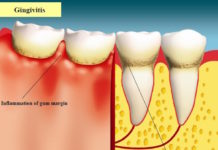 A drug currently used to treat intestinal worms could protect people from periodontitis, an advanced gum disease, which untreated can erode the structures — including bone — that hold the teeth in the jaw. The research was published ahead of print in Antimicrobial Agents and Chemotherapy.
A drug currently used to treat intestinal worms could protect people from periodontitis, an advanced gum disease, which untreated can erode the structures — including bone — that hold the teeth in the jaw. The research was published ahead of print in Antimicrobial Agents and Chemotherapy.
Current treatment for periodontitis involves scraping dental plaque, which is a polymicrobial biofilm, off of the root of the tooth. Despite this unpleasant and costly ordeal, the biofilm frequently grows back. But the investigators showed in an animal model of periodontitis that the drug Oxantel inhibits this growth by interfering with an enzyme that bacteria require for biofilm formation, says corresponding author Eric Reynolds, of the University of Melbourne, Australia. It does so in a dose-dependent manner, indicating efficacy.
The researchers began their search for a therapy for periodontitis by studying the symbioses of the periodontal pathogens, using genomics, proteomics, and metabolomics, in animal models of periodontitis. They soon found that the periodontal biofilm depended for growth on the availability of iron and heme (an iron-containing molecule related to hemoglobin), and that restricting these reduced levels of the enzyme, fumarate reductase. Since Oxantel was known to inhibit fumarate reductase in some bacteria, they then successfully tested its ability to inhibit fumarate reductase activity in Porphyromonas gingivalis, one of the major bacterial components of periodontitis biofilms. Fumarate reductase is absent from humans, making it an ideal drug target.
They also showed that Oxantel disrupted the growth of polymicrobial biofilms containing P. gingivalis, Tannerella forsythia, and Treponema denticola, a typical composition of periodontal biofilms, despite the fact that the latter alone is unaffected by Oxantel.
The researchers found that treatment with Oxantel downregulated six P. gingivalis gene products, and upregulated 22 gene products, all of which are part of a regulon (a genetic unit) that controls availability of heme.
Periodontitis affects an estimated 30-47 percent of the adult population with severe forms affecting 5-10 percent. It also increases the risks of diabetes, heart disease, stroke, arthritis, and dementia, says Reynolds. These risks arise due to the pathogenic bacteria that enter the blood stream from periodontitis, as well as from the chronic inflammation caused by this disease, he says. Additionally, periodontitis correlates with increased risk of cancers of the head and neck, the esophagus, the tongue, and the pancreas, the investigators report.
Source: S. Dashper, N. O’Brien-Simpson, S. W. Liu, R. Paolini, H. Mitchell, K. Walsh, T. D’Cruze, B. Hoffmann, D. Catmull, Y. Zhu, E. Reynolds. Oxantel disrupts polymicrobial biofilm development of periodontal pathogens. Antimicrobial Agents and Chemotherapy, 2013; DOI: 10.1128/AAC.01375-13












